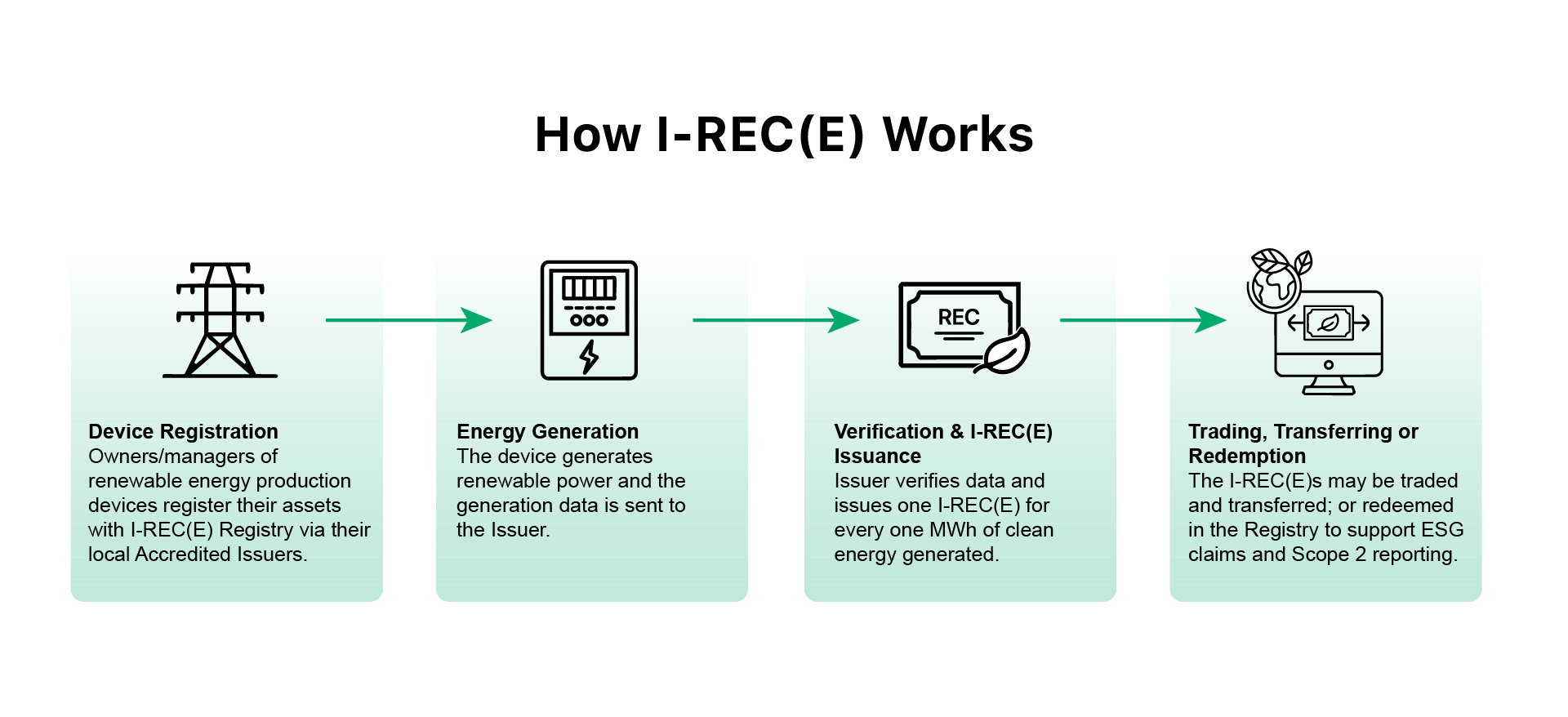Introduction to I-REC(E)
What is the I-REC(E)?

The I-REC for Electricity, or I-REC(E), is a universally recognised standard that certifies the renewable origin of electricity, ensuring credibility and sustainability in the energy sector. The I-REC(E) standard, adopted in more than 60 countries across Asia, Oceania, Africa, South America, and Middle America, mirrors the Guarantees of Origin in Europe and Renewable Energy Certificates (RECs) in North America, where one I-REC(E) guarantees the origin of one megawatt-hour (MWh) of renewable electricity injected into the grid.
The I-REC(E) is instrumental in Scope 2 emissions reporting, helping organisations demonstrate their commitment to renewable energy procurement, environmental responsibility, and corporate sustainability. It is especially valuable in regions where direct access to clean electricity is limited, offering a practical and cost-effective way to support the energy transition and meet climate goals.
How Does I-REC(E) Work?
The I-REC(E) standard, managed by the International Tracking Standard Foundation, or I-TRACK Foundation, serves as a robust attribute tracking system applicable worldwide. This standard necessitates collaboration with local stakeholders and government authorities, ensuring compliance with both local and national regulations. Recognised globally by major reporting frameworks like the Greenhouse Gas Protocol (GHGP), CDP, and RE100, the I-REC(E) offers a reliable foundation for credible and auditable tracking instruments. It emphasises the highest quality systems and adherence to best practices, effectively preventing issues like double counting, double certificate issuance, and double attribute claims.
At its core, the I-REC(E) system enforces strong governance, third-party auditing, and clear procedures to uphold the integrity of renewable electricity tracking. Certificates are issued, transferred, and retired through a secure digital registry, ensuring exclusive ownership, traceability, and accountability for every renewable energy claim.

Key Benefits of I-REC(E) for Companies
1. Support Sustainability Reporting
I-RECs(E) help companies report renewable electricity usage in a credible and verifiable way. They align with leading global frameworks such as the Greenhouse Gas Protocol (GHGP), CDP, and RE100, forming a reliable basis for transparent climate reporting and corporate sustainability disclosures.
2. Track Scope 2 Emissions
Organisations can use I-RECs(E) to account for indirect emissions from purchased electricity, also known as Scope 2 emissions. This ensures accurate greenhouse gas tracking across operations and strengthens climate-related accountability.
3. Procure Verified Renewable Sources
Each I-REC(E) represents electricity generated from approved renewable technologies such as solar, wind, hydro, geothermal, or bioenergy. Companies can be confident that their procurement supports clean and certified energy sources.
4. Improve Traceability and Supply Chain Transparency
Each I-REC(E) comes with auditable data that shows the origin and generation method of renewable electricity. This improves visibility across energy supply chains and supports stronger ESG performance and responsible sourcing strategies.
5. Access Global Renewable Markets
The I-REC(E) offers a practical way for companies to source renewable electricity in countries where local certification systems may not exist or are hard to access. This includes regions such as Asia, Latin America, Africa, and the Middle East. Businesses can maintain consistent renewable energy reporting across global markets.
6. Comply with Regional and Corporate Policies
The I-REC(E) can support national energy transition goals and internal decarbonisation plans. They help companies meet regulatory expectations and corporate sustainability targets without the need to build or operate renewable infrastructure.
7. Make Cost-Effective Renewable Claims
I-RECs(E) offer a more affordable path to making credible renewable energy claims compared to installing physical renewable systems. This makes them suitable for businesses aiming to reduce their carbon footprint efficiently.
8. Enhance Investor and Stakeholder Confidence
Using I-RECs(E) demonstrates a strong commitment to sustainability. This can increase trust among investors, customers, regulators, and employees while boosting brand reputation and long-term business value.
9. Contribute to the UN Sustainable Development Goals (SDGs)
By supporting renewable projects that generate renewable energy and I-RECs(E), companies contribute to global clean energy adoption, improved air quality, and positive social and environmental impacts in local communities.
Accelerate Your Business's Sustainability Strategy
with I-REC(E) through REDEX
Looking to source certified renewable electricity through a globally recogniszed renewable energy tracking system? By procuring I-RECs for Electricity, you join a movement of forward-thinking companies committed to a renewable future. Whether you’re a multinational company focused on Scope 2 reporting, GHG emissions reduction, or aligning with the UN Sustainable Development Goals (SDGs), REDEX will support each step of your I-REC(E) journey.
With tailored support and I-REC(E) solutions for renewable energy sourcing, REDEX connects you to recognised issuers and renewable energy power plants across Asia, Africa, and Latin America. Contact us to learn how I-RECs for Electricity can transform your energy profile and support your long-term sustainability strategy.
Frequently Asked Questions About I-RECs(E)
How does the I-REC(E) Registry ensure credibility and global recognition among sustainability initiatives?
The I-REC(E) Registry ensures credibility through robust governance mechanisms and international recognition. The I-REC Standard Foundation administers the International Attribute Tracking Standard, which outlines the requirements for registries, participants, and issuance processes. This ensures that attribute tracking is conducted with transparency, integrity, and accuracy.
The International Attribute Tracking Standard of I-REC(E) also ensures that market facilitators maintain best practices and good governance principles for the tracking instrument and the associated markets they manage. In this way, I-REC(E) can be implemented for a wide range of environmental products—not just electricity—that benefit from market confidence and independent oversight.
Built as a robust and internationally standardised framework, I-REC(E) enables businesses, governments, and institutions to make credible renewable electricity claims backed by traceable and verifiable data. The system is aligned with global decarbonisation efforts and plays a growing role in supporting ESG (Environmental, Social, and Governance) initiatives.
By aligning with country-specific energy policies while maintaining global consistency, I-REC(E) supports scalable implementation in diverse regulatory environments. It provides a reliable pathway for companies to meet their renewable energy targets, enhance transparency in Scope 2 disclosures, and lead with purpose in the global movement toward sustainable energy.
The I-REC(E) system is recognised by leading global sustainability frameworks including the Greenhouse Gas Protocol (GHGP), CDP, RE100, ISO standards, and others. These recognitions confirm that the I-REC(E) Registry meets rigorous standards for environmental claims and corporate reporting, making it a trusted tool for organisations seeking to meet Scope 2 reporting requirements.
With widespread adoption and support across both voluntary and compliance markets, I-REC(E) offers a future-ready solution for those seeking to participate in the clean energy movement with integrity, transparency, and global recognition.
Who regulates I-REC(E)?
I-RECs(E) are regulated by the International Tracking Standard Foundation in collaboration with local and national authorities. This ensures that the certificates meet stringent guidelines and adhere to international standards, providing businesses with a reliable method of certifying their renewable energy usage.
Who should register with the I-REC(E) Registry?
The I-REC(E) Registry is designed for key stakeholders across the renewable energy ecosystem who wish to certify, trade, or claim renewable electricity usage. Renewable energy producers, including owners of solar, wind, hydro, geothermal, and bioenergy facilities, must register as a Registrant with the local Issuer in their respective country. This allows them to officially register their production devices and request the issuance of I-REC(E) certificates, which serve as verifiable proof of renewable electricity generation.
In addition to producers, the I-REC(E) Registry is open to energy market participants such as electricity suppliers, renewable energy traders, and sustainability consultants who can use I-REC(E) certificates to validate clean energy transactions. Corporate buyers and organizations focused on achieving carbon neutrality, net-zero targets, or enhancing their ESG (Environmental, Social, and Governance) performance can also register as Participants to purchase and retire certificates that match their renewable energy consumption.
The Registry further supports governments and regulators looking to implement transparent tracking systems that align with international standards such as the Greenhouse Gas Protocol (GHGP), CDP, RE100, ISO, and national frameworks like the Singaporean REC Standard.
By joining the I-REC(E) Registry, stakeholders gain access to a globally trusted renewable energy tracking platform that enhances environmental reporting, improves sustainability disclosures, and drives the global transition to clean energy.
What is an I-REC(E) interest?
An I-REC(E) interest refers to the stake a company or individual holds in promoting and utilising renewable energy. By acquiring I-RECs(E), entities demonstrate their commitment to sustainable energy practices, contributing to global decarbonisation efforts and environmental responsibility.
Why purchase I-RECs(E)?
Purchasing an I-REC for Electricity, or I-REC(E), is pivotal for businesses aiming to authenticate their renewable energy use and reduce their carbon footprint. I-RECs(E) offer a credible and auditable means to support renewable energy initiatives, enhance corporate sustainability, and comply with international environmental standards.

